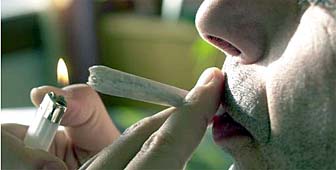Health officials seek to beat drugs at own game

Over 140 drug prevention projects are on show at a national meeting, which aims to take a more sophisticated approach to combating drug abuse.
Many of the projects at Radix, a national fair for the prevention of drug abuse, try to catch the attention of teenagers using the same means commonly associated with their opponents – the public relations managers and advertising agents who are on the payroll of powerful drinks and tobacco companies.
“Ten years ago, preventative measures tried to persuade young people to abstain from drugs altogether”, says Bernhard Meili of the drugs section of the Swiss federal health office.
“Today, many teenagers are experiencing drugs at an increasingly early age. To remain credible, our message must now be: ‘okay, maybe you consume some drugs for some time, but we are confident you’ll get out of it and can help you to minimise the risks.'”
Some projects on show at the Radix fair attempt at being “in and cool”. A large crowd of teenagers gathered around the “Simulator”, a console that responds to players who take its wheel like a racing car game in an electronic game saloon – except that it slows down the reaction of the ‘car’ depending on the amount of alcohol the ‘driver’ supposedly consumed.
Prevention campaigns have also stopped demonising the use of soft drugs. “The significant message has now filtered through that tobacco and alcohol are addictive, while cannabis is not”, Meili says.
Since the Swiss health authorities took the initiative 10 years ago to set up a preventative network against drug abuse, many people and groups outside experts and official health structures have become involved.
A group called “Migration and Health”, which is sponsored by the health ministry, is targeted at immigrants. “Foreigners are not more at risk to take drugs than any other group”, said Hüseyin Demirkan, an organiser with the group, “but they find it difficult to get access to the necessary information and assistance.”
“Migration and Health” employs professionals and volunteers to speak or make themselves available in immigrants’ clubs and associations.
A similar approach is chosen by “Femmes-Tische”, a group that promotes neighbourhood initiatives among women, and by “La Ola”, an initiative co-sponsored by health authorities and sports bodies that tackles the problem of drug abuse in amateur sports clubs where it was long considered a taboo. Fifty per cent of Swiss teenagers are members of one sports club or another.
Organisers of the fair said that the fight against drug abuse would focus increasingly on prevention.
Politicians are also rising to the challenge.
When Switzerland’s parliament recently passed a law allowing for a limited number of gambling casinos, operators had to submit schemes on how to combat gambling addiction. Casino employees, for instance, must be trained in how to detect addictive behaviour among their customers and how to approach them.
But are the efforts paying off? Switzerland is not only among the countries with the highest per capita expenditure on anti-drugs prevention policies, but also one with exceptionally high drugs consumption levels.
Meili says the results are mixed. “We have less health problems associated with hard drugs than 10 years ago”, he says. “On the other hand, we have more and more problems with the consumption of alcohol, tobacco and cannabis among the very young.”
by Markus Haefliger

In compliance with the JTI standards
More: SWI swissinfo.ch certified by the Journalism Trust Initiative
You can find an overview of ongoing debates with our journalists here . Please join us!
If you want to start a conversation about a topic raised in this article or want to report factual errors, email us at english@swissinfo.ch.